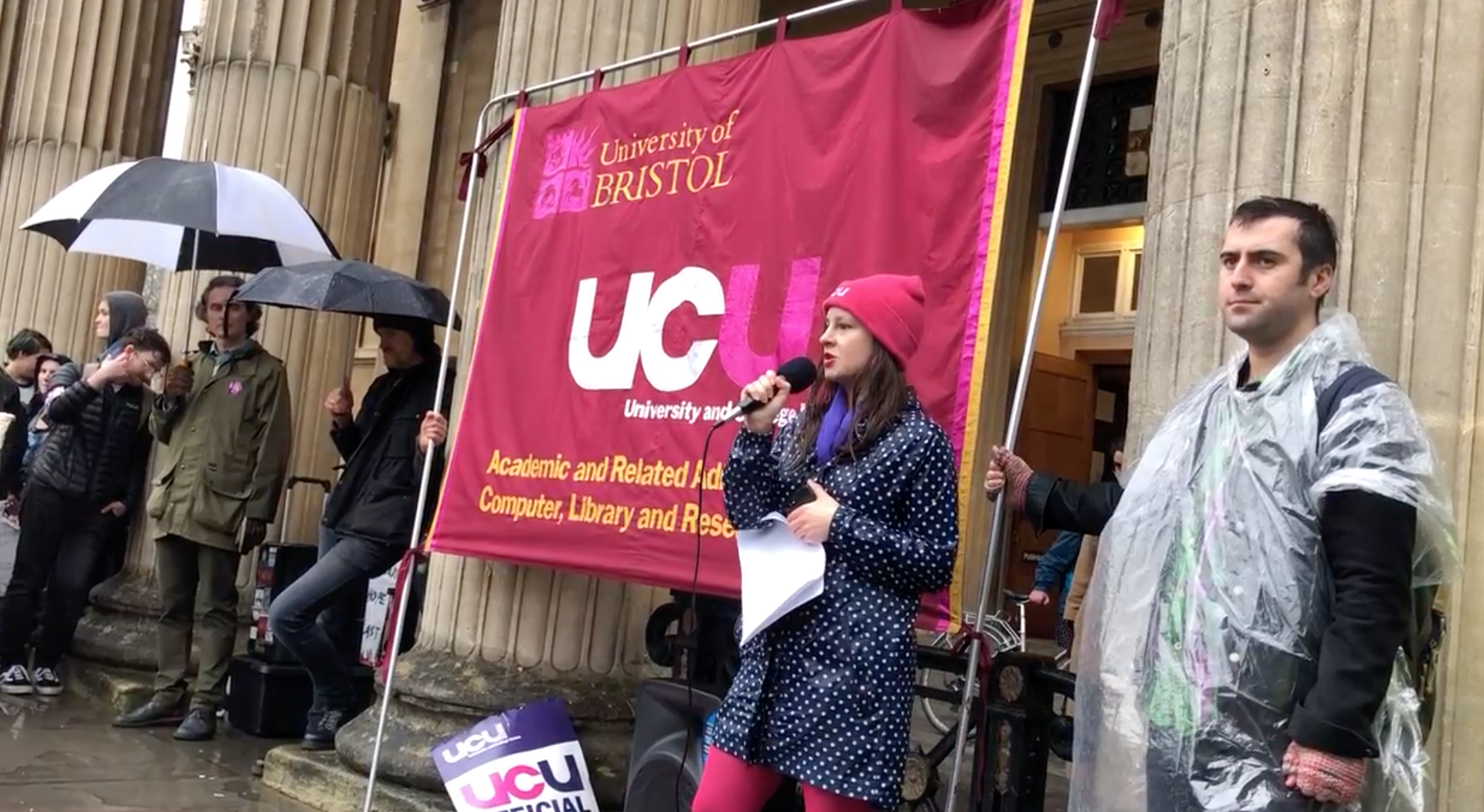Alex Birt, History, Second Year | Mark Ross, Opinion Editor
As part of the ongoing UCU strikes, university staff are forming picket lines across campus. For students, this poses the question: should we stay at home and respect the movement, or should we cross the picket lines to access much-needed resources?
AB: We all want to do well at university. We all want to get our nine grand’s worth. However, crossing the picket line is not going to improve conditions for anyone on campus. If anything, it will just make things worse.
When you cross that picket line you stand in solidarity with Hugh Brady and the exploitative practises that he is presiding over.

Students shouldn’t cross the picket line because doing so tells the University you don’t care about the way it treats its employees. As it stands, the University underpays and overworks its staff, and fails to give them adequate support or pensions. A recent proposed cut to the UCU pension scheme, for example, could see average retirement incomes of University staff reduced by 35 per cent.
Additionally, there’s the gender pay gap. Female staff might as well stop being paid in November, as they essentially do a month of unpaid work when their salary is compared to those of their male colleagues.
Members of @Bristol_UCU have been joining picket lines this morning as they begin the first day in their ten days of strike action in #Bristol https://t.co/zksOYZuspN
— Epigram (@EpigramPaper) February 14, 2022
If you care about basic worker’s rights, prove it - don’t cross the picket line.
Further, more than one tutor in the Faculty of Arts have expressed to me that they are underpaid to the extent that trainee lecturing staff are often having to choose between paying rent or being fed for the month.
Force the University to operate differently by not showing up
Even the present Dean of Arts, Karla Pollman, acknowledged that supporting yourself as an academic is one of the biggest obstacles to entering academia. And this has become even more prominent due to the treatment of staff at universities.
When you cross the picket line, you agree that this financial mistreatment and ethical misconduct is acceptable. And that stifling future academic curiosity is permissible.
Also, if you want your money’s worth – and post-COVID, I’m sure you do - then don’t cross the picket line. Overworked, stressed lecturers aren’t able to give you the educational support that your tuition fee has paid for. Secure working conditions will allow staff to provide the education that they are capable of and willing to give.
If your lectures are still on, force the University to operate differently by not showing up!
By simply staying home (and how easy is that?!) you are empowering staff and enabling them to provide you with the education that you paid for. What’s not to like?
MR: University staff are being exploited, and students are in the unique position of being able to do something about it. But crossing the picket line is a personal decision for which individuals should not be judged by the rest of us.
Students must weigh up the benefits of crossing the picket line against the damage that doing so would cause to the strike movement itself. And this depends on personal circumstances and value judgements, which evidently vary from person to person.
It is not for those who boycott lectures and libraries to judge those who do not
Forgoing a few hundred pounds’ worth of education to support the strikes is easier to stomach for some students than others.
One @Bristol_UCU placard reads ‘Trying to steal my pension? Kiss my USS’, in reference to the dispute over the Universities Superannuation Scheme (USS), which the @ucu claims could see the average guaranteed retirement income of a university staff member reduced by 35% pic.twitter.com/SsjBKRXJRc
— Epigram (@EpigramPaper) February 14, 2022
Some may need to cross the picket line to reach a quiet study space, perhaps because they could not afford a leafy Redland townhouse in which to read.
Others may have made extreme financial sacrifices to attend university, making lectures – which have been heavily disrupted throughout the last two years - precious.
And so, for some, crossing picket lines is understandable. It is not for those who boycott lectures and libraries to judge those who do not.
But let’s not forget that picket lines derive their symbolic power from the image of unity and solidarity that they portray. Hordes of students breaking the line undermines this message and damages the UCU movement. This must be remembered when making your own personal decision.
The USS scheme's deficit has shrunk by around 80% which means an already weak justification for cutting pensions has now evaporated
— UCU (@ucu) February 21, 2022
If vice chancellors don't withdraw their cuts, they'll be responsible for one of the biggest ever robberies in higher education#OneOfUsAllOfUs pic.twitter.com/GSvpQuvj2j
Picket lines aside, students still have an obligation to help staff, even if only because of their unique position as the primary income sources for universities. And so, we should at least apply pressure to the University in areas where protesting costs us nothing.
We should write to key decision makers (such as the Vice-Chancellor, or UUK) explaining our support for the UCU’s demands. Or attend rallies in our free time, such as the Student Strikes for Education on March 2nd in London (transport to which is provided for free).
We could attend a teach-out at the The Hope and Anchor on Monday (February 21st). Even liking the UCU Facebook page is a start.
Picket lines are important, but we must not lose sight of the issue at hand. Our University is being run as a business, squeezing profit out of its increasingly defenceless staff. Students are vital to reversing this exploitation and have a moral obligation to play their part. However, it is up to the individual, not the rest of us, to decide upon the limits of this obligation.
Featured image: Epigram
Do you think students should cross the picket lines? Let us know @EpigramOpinion !









